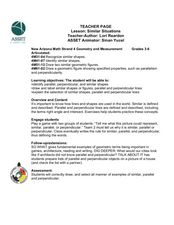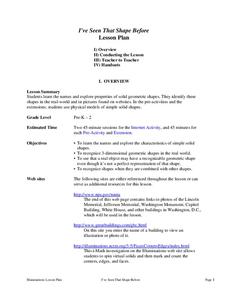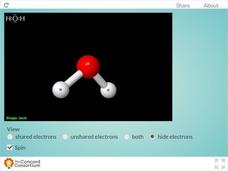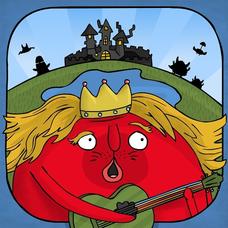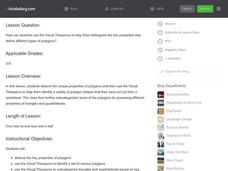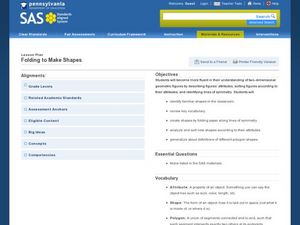Curated OER
Finding the Area of Shapes
In this area of shapes unit, upper graders participate in hands-on problem solving activities to find the formulas for the area of a parallelogram, a triangle, and a trapezoid. They manipulate the geoboard to explore relationships among...
Curated OER
Similar Situations
Students explore intersecting lines. In this intersecting lines lesson, students investigate shapes consisting of parallel, perpendicular, and similar lines. Students investigate these lines in shapes around them.
Curated OER
2-D and 3-D Presents at Pedro's Party
Fifth graders draw 2-D and 3-D shapes. They sketch and label geometric figures with correct terminology, then explore parallel and perpendicular lines. Pupils sort and classify shapes drawn.
Curated OER
Classifying Triangles Based On Properties of Angles
The interactive lesson featured here calls for the use of a Smartboard for sorting and classifying shapes. Then, pupils discuss the rules they followed for sorting their shapes, particularly focusing on the properties of angles. While...
Fayetteville Public Schools
I've Seen That Shape Before
The objectives in the resource allow young scholars to explore the characteristics of simple solid shapes. Youngsters learn to recognize the face shapes, corners, and edges that make up 3-D figures by filling in a chart....
Concord Consortium
Unshared Electrons and the "Bent" Shape
Why is water always so bent out of shape? Scholars investigate the molecular geometry of the water molecule using a 3-D resource. The interactive features options such as rotation and the ability to view electron pairs.
K-5 Math Teaching Resources
Tangram Cutout
Challenge the spatial thinking of your young mathematicians with this printable tangram puzzle. Using different sized triangles, squares, and parallelograms, children must figure out how to fit all the shapes together to create a square.
Curated OER
Shapes
Fifth graders explore shapes. They recognize and name two-dimensional and three-dimensional shapes. Pupils discuss the properties and criteria for each shape they find in real life and construct a Kid Pix project using pictures of the...
Centre for Innovation in Mamatics Teaching
Area, Perimeter and Volume
Develop young mathematicians' knowledge of two- and three-dimensional shapes with this geometry workbook. From learning about the classifications of different shapes and figures to calculating their area, perimeter, and volume, this...
Willow Tree
Angle Sum Property of Triangles
All triangles have some things in common. Using these properties of triangles, learners find missing angle measures. Scholars use the Angle Sum Property and properties of special triangles throughout the lesson.
Illustrative Mathematics
What is a Trapezoid? (Part 2)
This collaborative activity investigates the meaning of a trapezoid and a parallelogram. It begins by presenting two different definitions of a trapezoid. Learners are to reason abstractly the difference between the two definitions and...
iMagine Machine
The Land of Venn - Geometric Defense
Young mathematicians use their geometry skills to save the Land of Venn in an engaging math game. A fun way to reinforce children's understanding of basic geometric figures and shapes.
Curated OER
Parallel and Perpendicular Lines
Learners study parallel and perpendicular lines. For this parallel and perpendicular lesson, pupils explore 2-D shapes and determine if the sides are parallel or perpendicular.
Curated OER
Tiling Tessellations
Students explore tessellations. In this shapes and geometry lesson, students describe the attributes of many of the shapes displayed on an Elmo. Students create examples of tessellations using pattern blocks.
Curated OER
Third Grade Geometry
Third graders describe 2D and 3D shapes. In this geometry lesson, 3rd graders watch a PowerPoint presentation showing the terms used when analyzing shapes: vertex, edge, angle, side, and face. They compare shapes to see what they have in...
Curated OER
Shapes and Introduction to Geometry
Learners make a quilt. In this geometry lesson, students discuss patchwork quilts and learn some different geometric shapes and patterns that are commonly used. Learners explore designs with triangles and squares and then make their own...
Curated OER
Property Lists for Quadrilaterals
Students establish classifications of shapes by various properties (angles, sides, etc.). They introduce the important properties of common shapes. Students develop an awareness of the wide variety of ways the 2-D shapes can be alike.
Curated OER
Learning Shapes
In this learning shapes instructional activity, students match given shapes to their proper name. In addition, students count the number of shapes identified in a model. Shapes include a rhombus, square, circle, hexagon, trapezoid,...
Curated OER
Know Your Polygons!
Students identify and categorize different polygons. In this polygons lesson plan, students research and identify properties of polygons, identify different polygon shapes, and categorize different triangles and quadrilaterals.
Curated OER
Length, Perimeter, and Area
Pupils explore the concepts of length, perimeter, and area. In this math instructional activity, students use Shape Explorer to practice finding length, perimeter, and area.
Curated OER
Properties of Quadrilaterals
In this properties of quadrilaterals worksheet, students use the properties of quadrilaterals to find the perimeter, angle measurement or length of a missing side of a given polygon. Examples and explanations of the properties are...
Curated OER
Folding to Make Shapes
Second graders identify different polygons and their attributes. In this geometry lesson, 2nd graders get to know polygons by studying the vocabulary and finding polygons in their classroom. They create these shapes and then find their...
Curated OER
Living in a Geometrical World
Students participate in a series of hand-on, online, and multimedia activities to examine 2 dimensional and 3 dimensional shapes. They describe common geometric solids. They construct rectangular prisms using straws and ribbon.
Curated OER
Match the Number Sentence!
Matching number sentences to their visual equivalents may seem easy, but there is a trick here to keep your learners thinking about math properties. As they examine the numerical forms of six addition problems, they must...

